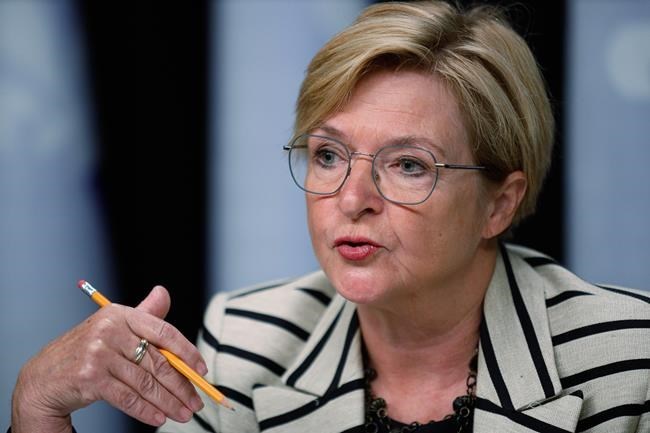
Quebec Auditor General Guylaine Leclerc explains her annual report at the legislature in Quebec city on Monday, Aug. 15, 2022. THE CANADIAN PRESS/Francis Vachon.
Republished August 15, 2022 - 12:57 PM
Original Publication Date August 15, 2022 - 1:06 AM
While inflation may be hurting ordinary Quebecers' pocketbooks, it's done the opposite for a provincial government that has seen its projected deficit shrink by billions of dollars, according to a report released Monday ahead of the fall election campaign.
The government's projected finances are "plausible" despite global economic uncertainty that threatens to darken the rosy picture, said auditor general Guylaine Leclerc, who was tasked with reviewing a pre-election financial report by Quebec's finance minister.
Inflation, Leclerc said, "has a lot to do" with filling the government coffers, thanks to increased tax revenue from salaries and sales tax.
"At the level of the (fiscal) year 2022-23, at the accounting level, we forecast a surplus," she told a Quebec City news conference.
Finance Minister Eric Girard's report, also released Monday, showed that Quebec would finish the current fiscal year with an operating surplus of $1.7 billion — the government had predicted a deficit of roughly $3 billion in March's budget. However, Quebec law states that certain payments must be made toward reducing the provincial debt; therefore, the government estimates it will finish the fiscal year with a deficit of $729 million.
In a news conference following Leclerc's report, Girard said Quebec's economy has continued to outperform expectations, and he promised to cut personal income taxes if re-elected on Oct. 3. He said Quebecers have a high tax burden and pay four to five per cent more tax than other Canadians do, on average.
"What we would like to do in a second mandate would be to reduce the gap between the personal income tax burden of Quebecers versus the rest of North America or Canada," he said.
Girard said he did not anticipate a recession, but rather a slowdown in growth, down to 1.7 per cent in 2023 from 3.4 per cent in 2022. Inflation is estimated 6.5 per cent for 2022 and 3.2 per cent the following year, he added.
Revenue from personal income tax — the state's largest source of revenue — is expected to jump 5.2 per cent from 2021-22 to 2022-23. Revenue from consumption tax will total $27.3 billion in 2022-23, up 10.8 per cent from 2021-2022.
With Girard's promise to cut income taxes, the Coalition Avenir Québec becomes the third party to promise substantial tax cuts if elected, following the Quebec Liberal and Conservative parties. Girard did not specify how the province would finance the tax cuts, promising only that it would be done in an "orderly and responsible" way that would not involve cutting services.
Leclerc, meanwhile, was tasked with determining whether the government's financial forecasts, estimates and assumptions made ahead of the October provincial election were realistic. The purpose of Leclerc's review is to ensure that political parties have accurate information on which to base their platforms and can't claim to be surprised by an unexpected deficit or surplus after the election.
Leclerc concluded that the current government's forecasts for this fiscal year and the next two are "plausible," but she added that the situation could change due to high levels of uncertainty.
"Soaring inflation, the war in Ukraine and the COVID-19 pandemic are creating a lot of uncertainty, which could cause actual results to differ materially from forecasts," Leclerc said.
Girard's report, she said, took into account the latest statistics, laws and economic forecasts, and also included a "margin of caution," which Girard said amounted to about $2 billion per year over the next five years to help cover the unexpected.
Leclerc's main criticism was that the government did not provide an "alternative scenario" detailing what would happen if some of the worst-case risks are realized, which "would have been useful," she said.
Liberal finance critic Carlos Leitão acknowledged that there was "no longer a structural deficit" in Quebec thanks to a sharp increase in revenues, but he criticized the Legault government for not doing more to help taxpayers cope with the rising cost of living.
Quebec solidaire legislature member Ruba Ghazal said the improvement in public finances is nothing for the government to brag about.
“If public finances are doing well, it is because life is more expensive for taxpayers," she said.
This report by The Canadian Press was first published Aug. 15, 2022.
News from © The Canadian Press, 2022